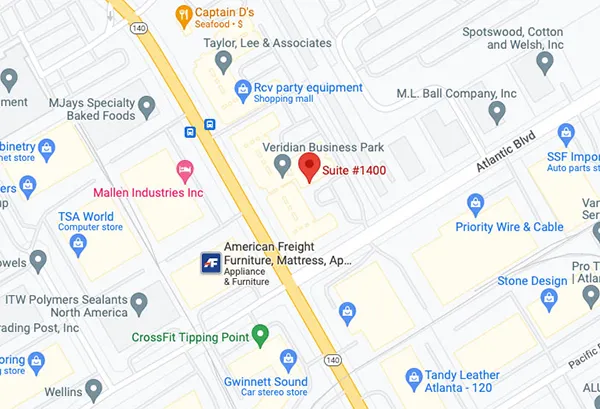Your Information
Strategic & UNDERUTILIZED litigation tools:
Plaintiff's Motion to Determine Sufficiency of Answers (RFAs)
Reshape Your Strategy With Request For Admissions With Our Motion To Determine Sufficiency Of Answers.
In the nuanced world of personal injury litigation, precision and timing can mean the difference between winning and losing a case. At Georgia Trial Attorneys, we appreciate these subtleties. We aim to supply fellow lawyers with the tools for effective litigation and guide them toward success.

A critical key to successful litigation and discovery is Plaintiff’s Motion To Determine The Sufficiency Of Defendant’s Answers Or Objections, as detailed in O.C.G.A. 9-11-36(a)(3). This motion, seldom used, packs a punch. It can alter your case’s trajectory, especially during the initial discovery phase.
Plaintiffs' attorneys frequently settle for vague responses from Defendants and Uninsured/Underinsured Motorist Carriers. An insufficient response typically reads: “Upon reasonable inquiry, [Party] can neither admit nor deny this request for want of sufficient information to form a belief as to the truth thereof.” This response is legally insufficient! Such a response must include a statement from the responding party detailing the necessary information for an adequate response.
Additionally, Defendants or UM Carriers often blanket-deny all requests for admissions. This method is typically adopted when opposing counsel is unable to communicate with their client, favoring a full denial over no response. And too often, Plaintiff's attorneys simply accept these insufficient responses.
In Georgia, an unexplained inability or refusal to admit or deny a matter will be considered an insufficient response. Gregory v. Vance Publishing Corp., 130 Ga. App. 118 (1973). However, it is important to note that such an insufficiency could be treated as an admission only after the querying party challenges the sufficiency of the answers, and a hearing on the motion is held. Clements v. Toombs County Hosp. Auth., 175 Ga. App. 651 (1985). Further, evasive or ambiguous responses can also be treated as an outright admission if challenged by the opposing party. Match Point, Ltd. v. Adams, 148 Ga. App. 673 (1979).
Filing this motion after receiving legally insufficient RFA responses puts the reins back into the hands of the Plaintiff. The Defendant is then obliged to submit complete responses, or else, the court will rule they are admitted. In our experience, this motion has expedited settlements, benefiting our clients.
Our free template is essential in navigating the nuances of O.C.G.A. 9-11-36(a)(3). Use it to force insurance carriers to pay top dollar on each case. Click 'Download Here' to get started. Knowledge is power, arm yourself today:
PREVIEW:
IN THE STATE COURT OF HALL COUNTY
STATE OF GEORGIA
JOHN DOE,
PLAINTIFF,
v.
ROBERT SMITH,
DEFENDANT.
CIVIL ACTION
FILE NO.:
PLAINTIFF’S MOTION TO DETERMINE THE SUFFICIENCY OF DEFENDANT’S ANSWERS OR OBJECTIONS
COMES NOW, Plaintiff, John Doe, in the above-styled civil action, and hereby files their Motion to Determine the Sufficiency of Defendant Robert Smith’s Answers or Objections to Plaintiff’s Request for Admissions to Defendant Robert Smith, showing the Court as follows:
Statement of Facts
1. On [DATE], Plaintiff filed a complaint for personal injury against Defendant(s).
2. On [DATE], Defendant Robert Smith (hereinafter “Defendant Smith”) was personally served with the summons, complaint, request for admissions, interrogatories, request for production of documents, leave of absence and rule 5.2 certification.
3. Plaintiff’s request for admissions included [NUMBER] separate and individual requests.
4. On [DATE], Defendant Smith filed an answer to Plaintiff’s complaint as well as Defendant Robert Smith’s Response to Plaintiff’s Request for Admission.
5. Defendant Smith’s response to Plaintiff’s [NUMBER] individual request for admissions was as follows:
“Having made reasonable inquiry, the information known or readily obtainable is insufficient to allow the Defendant to either admit or deny Requests No. 1-[NUMBER]. Any Request for Admission contained in Plaintiff's Request for Admissions not here and before responded to is denied”
6. Defendant Smith failed to provide any reasoning or statement as to why Defendant Smith was unable to answer a single request for admission.
7. Defendant Smith failed to admit basic facts such as “Admit this Defendant was personally served with the summons and complaint in this action.” This was evidenced by the affidavit of personal service.
8. Defendant Smith failed to admit basic facts such as “Admit this Defendant was issued a citation for following too closely.” This was evidenced by the police report and corresponding citation.
9. Defendant Smith’s denials are baseless and without merit.
10. On [DATE], Plaintiff sent a good faith letter to Defendant Smith requesting that Defendant Smith amend and supplement their responses to Plaintiff’s request for admission.
11. To date, no supplement or amendment has been received.
Citations of Authority
12. O.C.G.A 9-11-36 states in pertinent part, regarding request for admissions, that:
The party who has requested the admissions may move to determine the sufficiency of the answers or objections. Unless the court determines that an objection is justified, it shall order that an answer be served. If the court determines that an answer does not comply with the requirements of this subsection, it may order either that the matter is admitted or that an amended answer be served. The court may, in lieu of these orders, determine that final disposition of the request be made at a pretrial conference or at a designated time prior to trial. Paragraph (4) of subsection (a) of Code Section 9-11-37 shall apply to the award of expenses incurred in relation to the motion.
A. Insufficient Or Evasive Admission Can Be Admitted By The Court
13. The Court of Appeals in Gregory v. Vance Publishing Corp. held that a “General statement that the answering party can neither admit nor deny, unaccompanied by reasons, will be held an insufficient response, and the court may either take the matter as admitted or order a further answer.” Gregory v. Vance Publishing Corp., 130 Ga. App. 118 (1973) (see also Clements v. Toombs County Hosp. Auth., 175 Ga. App. 651 (1985)).
Need Support Or Have Questions?
We invite you to explore our other free resources and learn more about the art of drafting effective pleadings and letters. We firmly believe in the power of knowledge and the importance of sharing that knowledge with our peers.
If you have any questions, need additional resources, or require assistance with a case, don't hesitate to contact our team of skilled personal injury attorneys. Together, we can raise the bar in personal injury litigation and ensure justice is achieved in every case.


